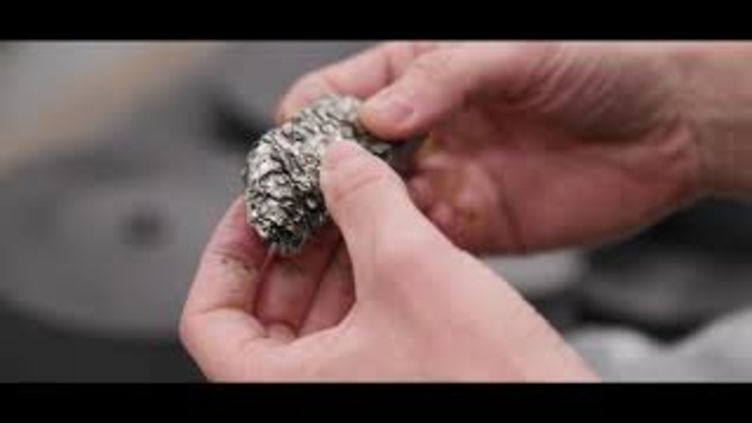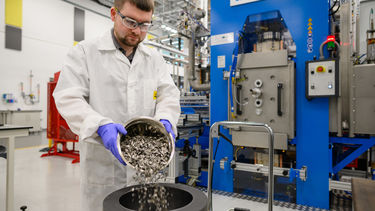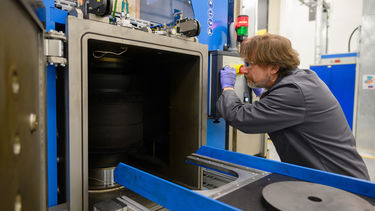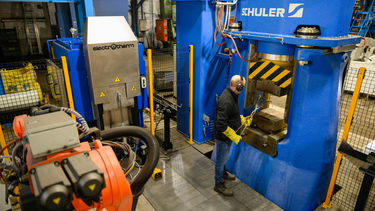Titanium has long been held as a bit of a wonder material, holding properties that are highly sought after in industry such as its high-strength, low-weight, and pressure resistance. Because of this it’s considered ideal for all sorts of highly specialised applications such as parts for aerospace, electrolysers in green-hydrogen production, and armour plates for tanks and other defence applications.
But…
It’s a highly expensive material, and this stops so many industries and businesses from being able to utilise titanium, in spite of its being the best metal for the job.
In spite of this, when it comes to manufacturing highly specialised parts, it’s not uncommon for up to 90% of the material to be machined away, much like carving out a sculpture from a block of wood, so you’re left with a huge amount of seemingly useless, sawdust-esque waste known as swarf.
Industry needs to massively change the way that they’re processing their waste and look to be more sustainable. The FAST-Forge process is a really elegant way of doing this. The beauty of this process is there's no waste. The flash from forging can be recycled back through the FAST-Forge process and the cycle continues.
Kate Bowers
Advanced Metallic Systems Doctoral Researcher, University of Sheffield
This is where the work of Sheffield Titanium Alloy Research (STAR) at the University of Sheffield has been able to offer up a revolutionary new process; FAST-Forge, that can take this swarf and use it to re-form usable raw material pieces. This new material has been tested at various forging factories with much success; David Lunn of W. H. Tildesley reports that using FAST-Forged titanium versus traditional titanium extends the use of their moulds from 200-300 uses to in excess of 1000, in other words, increasing the part life by at least 300%. This increase in machining life (and therefore decreased maintenance needs), the ease of forging, and reduced need for heating makes the forging dramatically cheaper and more energy efficient. Combine this with the fact the production process is now a closed-loop, continually reusing waste by-products to create new, high spec items, FAST-Forge makes titanium products far more sustainable as well as economically viable.
Titanium is an aerospace material, but due to wastage, for every 10 kg of material we import, only 1 kg ends up in the air. So in order to counteract this, at the University of Sheffield, we have developed a solid state recycling process that we term ‘FAST-Forge’. Our work at the Royce Discovery Centre has and the investment from the Henry Royce Institute has enabled us to become a Centre of Excellence in this field.
Prof. Martin Jackson
Advanced Metals Processing, University of Sheffield and the Henry Royce Institute
The research team have worked very closely with local manufacturers of hand tools, Footprint Tools, which is home to the Henry Royce Institute’s linear forging hammer (the only one of its kind in the U.K.). With the support and guidance of the Advanced Forming Research Centre (AFRC) who maintain the hammer, all three teams have been able to collaborate to prove that both the material and the method have the potential to revolutionise how we go about manufacturing in the future. Industry-standard and scalable equipment on factory floors yields significantly more data and information than in a purely research-based setup. This has enabled a relatively small Sheffield business to benefit from state-of-the-art equipment to develop their own more effective and efficient manufacturing processes.
Footprint Tools are manufacturers of hand tools and we've always wanted to go up the technology ladder with both the equipment that we use, and the products that we make. Working with the Advanced Forming Research Centre and the Henry Royce Institute has allowed us to do just that. By installing their equipment in our production environment, we have the opportunity to develop new products, but it gives the AFRC and Royce the data they need to advance their research and development, which they wouldn't be able to get in a research environment.
Richard Jewitt
Managing Director, Footprint Tools Ltd




